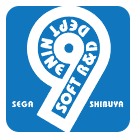Difference between revisions of "United Game Artists"
From Sega Retro
m |
|||
| Line 10: | Line 10: | ||
}} | }} | ||
| − | '''United Game Artists''' (ユナイテッド・ゲーム・アーティスツ) was a development division established in 2000 as part of [[Sega]]. It can almost be seen to address the "leftovers" of the 2000 restructuring of the company, members originating from [[Sega AM6]], while behing headded by [[Tetsuya Mizuguchi]], [[Sega AM3]] veteran who had formed [[AM Annex]]/[[Sega AM8]]. | + | '''United Game Artists''' (ユナイテッド・ゲーム・アーティスツ), was a development division established in 2000 as part of [[Sega]]. It can almost be seen to address the "leftovers" of the 2000 restructuring of the company, members originating from [[Sega AM6]], while behing headded by [[Tetsuya Mizuguchi]], [[Sega AM3]] veteran who had formed [[AM Annex]]/[[Sega AM8]]. It was originally titled '''Sega AM R&D #9''', however only used this name when publishing the Japanese version of ''[[Space Channel 5]]''. Unlike other AM departments it was not restructured after its rename, so is by and large the same thing. |
United Game Artists' existence was short-lived when compared to other "AM teams" - it was the first to be reformed in 2003 when it was merged with [[Sonic Team]] after only three [[Sega Dreamcast]] games were released. Other teams within Sega would be reorganised the following year. The changes at Sega during this period prompted Mizuguchi and others from UGA to leave the company and form their own development studio, Q Entertainment. | United Game Artists' existence was short-lived when compared to other "AM teams" - it was the first to be reformed in 2003 when it was merged with [[Sonic Team]] after only three [[Sega Dreamcast]] games were released. Other teams within Sega would be reorganised the following year. The changes at Sega during this period prompted Mizuguchi and others from UGA to leave the company and form their own development studio, Q Entertainment. | ||
| − | + | [[File:SegaAM9 logo.png|thumb|right|AM9 logo.]] | |
Notably all three of UGA's games have become cult classics. | Notably all three of UGA's games have become cult classics. | ||
Revision as of 07:21, 20 April 2015
United Game Artists (ユナイテッド・ゲーム・アーティスツ), was a development division established in 2000 as part of Sega. It can almost be seen to address the "leftovers" of the 2000 restructuring of the company, members originating from Sega AM6, while behing headded by Tetsuya Mizuguchi, Sega AM3 veteran who had formed AM Annex/Sega AM8. It was originally titled Sega AM R&D #9, however only used this name when publishing the Japanese version of Space Channel 5. Unlike other AM departments it was not restructured after its rename, so is by and large the same thing.
United Game Artists' existence was short-lived when compared to other "AM teams" - it was the first to be reformed in 2003 when it was merged with Sonic Team after only three Sega Dreamcast games were released. Other teams within Sega would be reorganised the following year. The changes at Sega during this period prompted Mizuguchi and others from UGA to leave the company and form their own development studio, Q Entertainment.
Notably all three of UGA's games have become cult classics.
Softography
Dreamcast
- Space Channel 5 (1999)
- Space Channel 5 Part 2 (2000)
- Rez (2001)
PlayStation 2
- Rez (2001)
- Space Channel 5 (2002)
- Space Channel 5 Part 2 (2002)
- Space Channel 5: Special Edition (2003)
| Timeline of Sega of Japan research and development divisions |
|---|
|
83
84
85
86
87
88
89
90
91
92
93
94
95
96
97
98
99
00
01
02
03
04
05
06
07
08
09
10
11
12
13
14
15
16
17
18
19
20
21
22
|
